The Impact of National Education Standards in New Zealand
VerifiedAdded on 2021/06/15
|6
|1639
|63
Report
AI Summary
This report examines the educational issue of National Standards in New Zealand, focusing on its impact on students, teachers, and the curriculum. The paper discusses the context of the reforms, highlighting the concerns raised by the NZEI regarding curriculum narrowing and increased teacher workload. It analyzes the decline in international test scores and the perceived inadequacy of the curriculum in subjects like mathematics, technology, and science. The report explores the shift towards a new system, emphasizing the government's focus on broader competencies and the achievement of all learners. It contrasts the views of proponents and opponents of the National Standards, discussing the pressure on students and teachers, and the arguments for and against standardized benchmarks. The report concludes by reflecting on the eventual removal of the standards, the positive responses from educators, and the government's commitment to developing a new system in consultation with teachers and school principals, emphasizing the importance of adapting to the changing world.
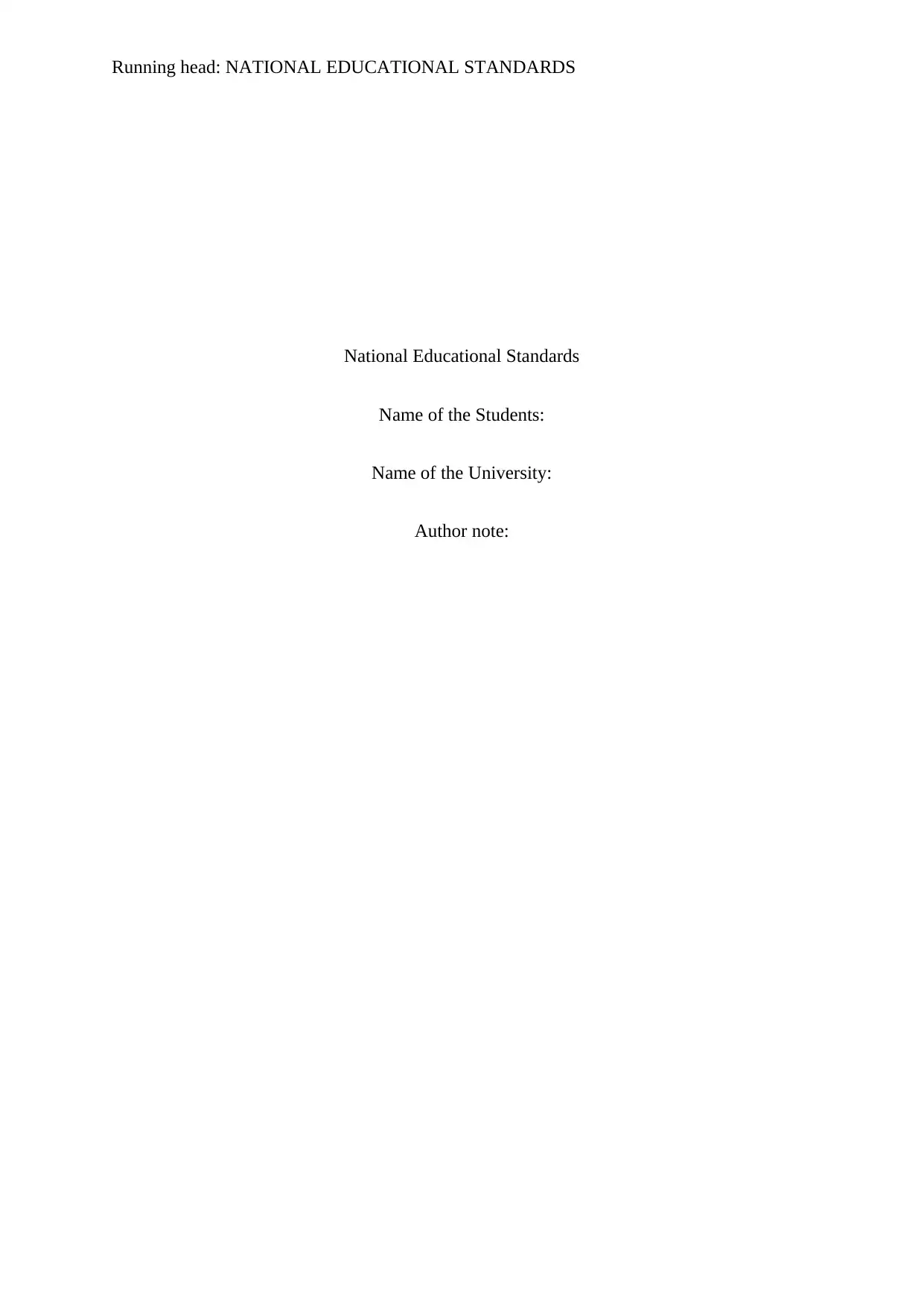
Running head: NATIONAL EDUCATIONAL STANDARDS
National Educational Standards
Name of the Students:
Name of the University:
Author note:
National Educational Standards
Name of the Students:
Name of the University:
Author note:
Paraphrase This Document
Need a fresh take? Get an instant paraphrase of this document with our AI Paraphraser
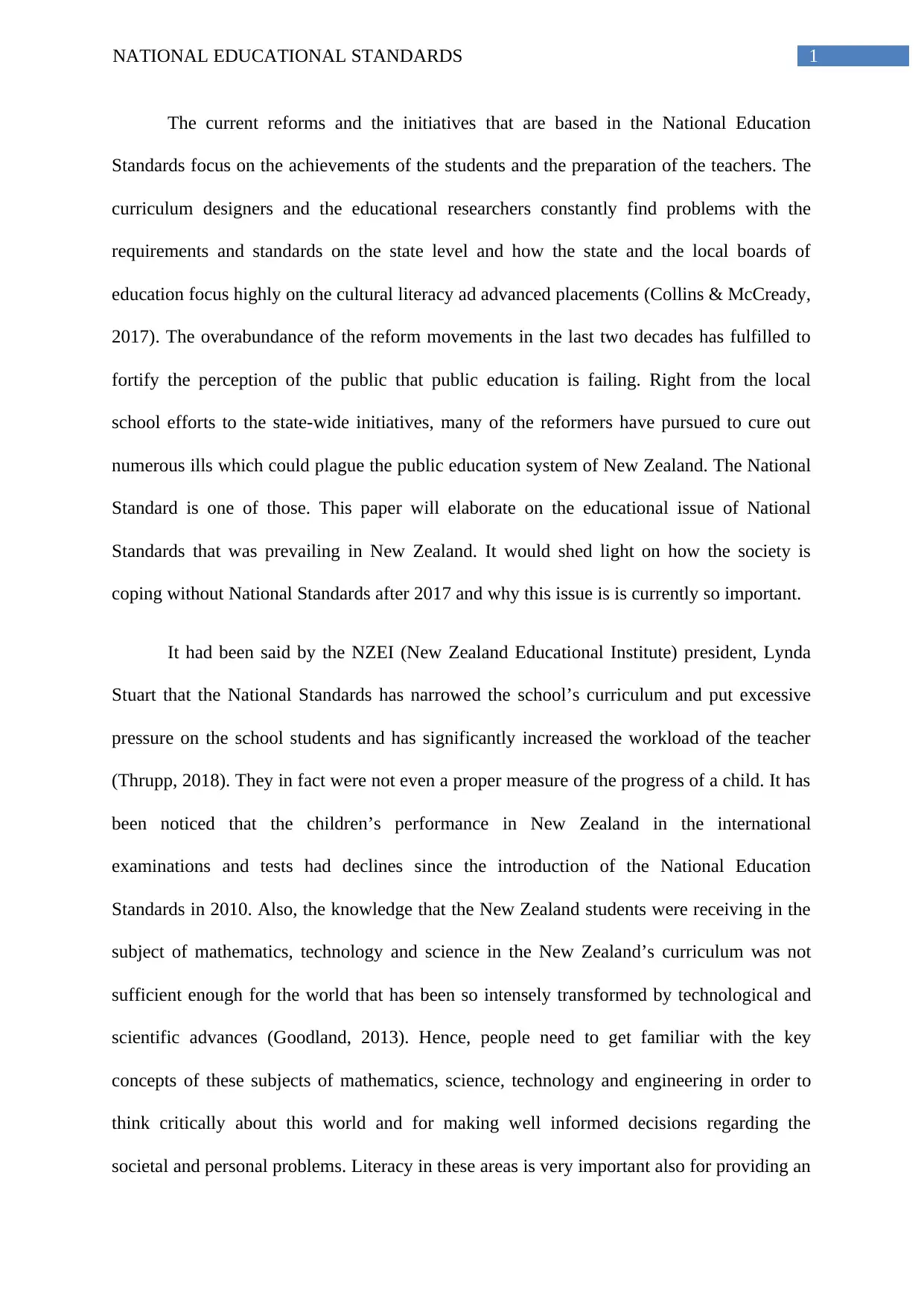
1NATIONAL EDUCATIONAL STANDARDS
The current reforms and the initiatives that are based in the National Education
Standards focus on the achievements of the students and the preparation of the teachers. The
curriculum designers and the educational researchers constantly find problems with the
requirements and standards on the state level and how the state and the local boards of
education focus highly on the cultural literacy ad advanced placements (Collins & McCready,
2017). The overabundance of the reform movements in the last two decades has fulfilled to
fortify the perception of the public that public education is failing. Right from the local
school efforts to the state-wide initiatives, many of the reformers have pursued to cure out
numerous ills which could plague the public education system of New Zealand. The National
Standard is one of those. This paper will elaborate on the educational issue of National
Standards that was prevailing in New Zealand. It would shed light on how the society is
coping without National Standards after 2017 and why this issue is is currently so important.
It had been said by the NZEI (New Zealand Educational Institute) president, Lynda
Stuart that the National Standards has narrowed the school’s curriculum and put excessive
pressure on the school students and has significantly increased the workload of the teacher
(Thrupp, 2018). They in fact were not even a proper measure of the progress of a child. It has
been noticed that the children’s performance in New Zealand in the international
examinations and tests had declines since the introduction of the National Education
Standards in 2010. Also, the knowledge that the New Zealand students were receiving in the
subject of mathematics, technology and science in the New Zealand’s curriculum was not
sufficient enough for the world that has been so intensely transformed by technological and
scientific advances (Goodland, 2013). Hence, people need to get familiar with the key
concepts of these subjects of mathematics, science, technology and engineering in order to
think critically about this world and for making well informed decisions regarding the
societal and personal problems. Literacy in these areas is very important also for providing an
The current reforms and the initiatives that are based in the National Education
Standards focus on the achievements of the students and the preparation of the teachers. The
curriculum designers and the educational researchers constantly find problems with the
requirements and standards on the state level and how the state and the local boards of
education focus highly on the cultural literacy ad advanced placements (Collins & McCready,
2017). The overabundance of the reform movements in the last two decades has fulfilled to
fortify the perception of the public that public education is failing. Right from the local
school efforts to the state-wide initiatives, many of the reformers have pursued to cure out
numerous ills which could plague the public education system of New Zealand. The National
Standard is one of those. This paper will elaborate on the educational issue of National
Standards that was prevailing in New Zealand. It would shed light on how the society is
coping without National Standards after 2017 and why this issue is is currently so important.
It had been said by the NZEI (New Zealand Educational Institute) president, Lynda
Stuart that the National Standards has narrowed the school’s curriculum and put excessive
pressure on the school students and has significantly increased the workload of the teacher
(Thrupp, 2018). They in fact were not even a proper measure of the progress of a child. It has
been noticed that the children’s performance in New Zealand in the international
examinations and tests had declines since the introduction of the National Education
Standards in 2010. Also, the knowledge that the New Zealand students were receiving in the
subject of mathematics, technology and science in the New Zealand’s curriculum was not
sufficient enough for the world that has been so intensely transformed by technological and
scientific advances (Goodland, 2013). Hence, people need to get familiar with the key
concepts of these subjects of mathematics, science, technology and engineering in order to
think critically about this world and for making well informed decisions regarding the
societal and personal problems. Literacy in these areas is very important also for providing an
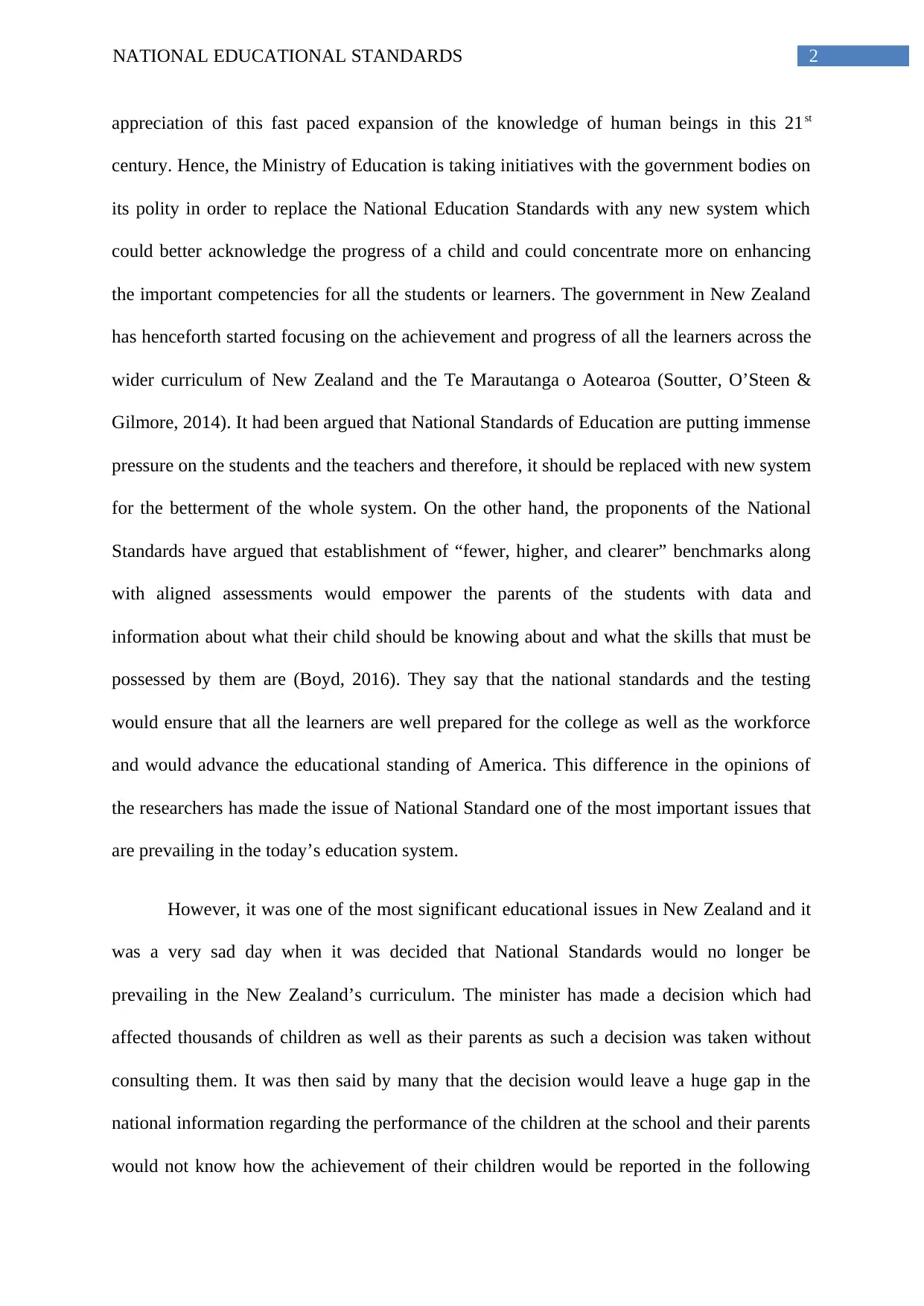
2NATIONAL EDUCATIONAL STANDARDS
appreciation of this fast paced expansion of the knowledge of human beings in this 21st
century. Hence, the Ministry of Education is taking initiatives with the government bodies on
its polity in order to replace the National Education Standards with any new system which
could better acknowledge the progress of a child and could concentrate more on enhancing
the important competencies for all the students or learners. The government in New Zealand
has henceforth started focusing on the achievement and progress of all the learners across the
wider curriculum of New Zealand and the Te Marautanga o Aotearoa (Soutter, O’Steen &
Gilmore, 2014). It had been argued that National Standards of Education are putting immense
pressure on the students and the teachers and therefore, it should be replaced with new system
for the betterment of the whole system. On the other hand, the proponents of the National
Standards have argued that establishment of “fewer, higher, and clearer” benchmarks along
with aligned assessments would empower the parents of the students with data and
information about what their child should be knowing about and what the skills that must be
possessed by them are (Boyd, 2016). They say that the national standards and the testing
would ensure that all the learners are well prepared for the college as well as the workforce
and would advance the educational standing of America. This difference in the opinions of
the researchers has made the issue of National Standard one of the most important issues that
are prevailing in the today’s education system.
However, it was one of the most significant educational issues in New Zealand and it
was a very sad day when it was decided that National Standards would no longer be
prevailing in the New Zealand’s curriculum. The minister has made a decision which had
affected thousands of children as well as their parents as such a decision was taken without
consulting them. It was then said by many that the decision would leave a huge gap in the
national information regarding the performance of the children at the school and their parents
would not know how the achievement of their children would be reported in the following
appreciation of this fast paced expansion of the knowledge of human beings in this 21st
century. Hence, the Ministry of Education is taking initiatives with the government bodies on
its polity in order to replace the National Education Standards with any new system which
could better acknowledge the progress of a child and could concentrate more on enhancing
the important competencies for all the students or learners. The government in New Zealand
has henceforth started focusing on the achievement and progress of all the learners across the
wider curriculum of New Zealand and the Te Marautanga o Aotearoa (Soutter, O’Steen &
Gilmore, 2014). It had been argued that National Standards of Education are putting immense
pressure on the students and the teachers and therefore, it should be replaced with new system
for the betterment of the whole system. On the other hand, the proponents of the National
Standards have argued that establishment of “fewer, higher, and clearer” benchmarks along
with aligned assessments would empower the parents of the students with data and
information about what their child should be knowing about and what the skills that must be
possessed by them are (Boyd, 2016). They say that the national standards and the testing
would ensure that all the learners are well prepared for the college as well as the workforce
and would advance the educational standing of America. This difference in the opinions of
the researchers has made the issue of National Standard one of the most important issues that
are prevailing in the today’s education system.
However, it was one of the most significant educational issues in New Zealand and it
was a very sad day when it was decided that National Standards would no longer be
prevailing in the New Zealand’s curriculum. The minister has made a decision which had
affected thousands of children as well as their parents as such a decision was taken without
consulting them. It was then said by many that the decision would leave a huge gap in the
national information regarding the performance of the children at the school and their parents
would not know how the achievement of their children would be reported in the following
⊘ This is a preview!⊘
Do you want full access?
Subscribe today to unlock all pages.

Trusted by 1+ million students worldwide
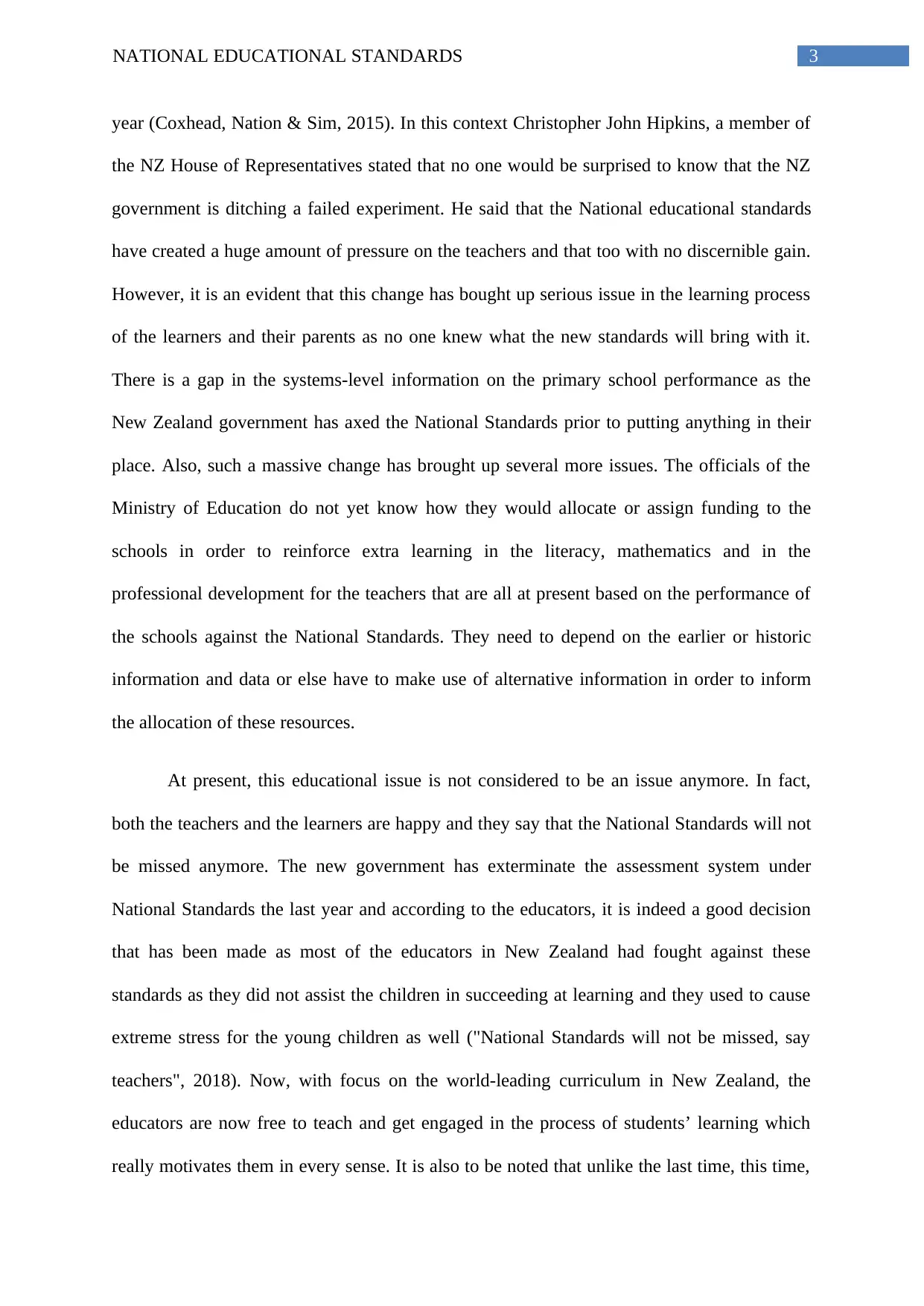
3NATIONAL EDUCATIONAL STANDARDS
year (Coxhead, Nation & Sim, 2015). In this context Christopher John Hipkins, a member of
the NZ House of Representatives stated that no one would be surprised to know that the NZ
government is ditching a failed experiment. He said that the National educational standards
have created a huge amount of pressure on the teachers and that too with no discernible gain.
However, it is an evident that this change has bought up serious issue in the learning process
of the learners and their parents as no one knew what the new standards will bring with it.
There is a gap in the systems-level information on the primary school performance as the
New Zealand government has axed the National Standards prior to putting anything in their
place. Also, such a massive change has brought up several more issues. The officials of the
Ministry of Education do not yet know how they would allocate or assign funding to the
schools in order to reinforce extra learning in the literacy, mathematics and in the
professional development for the teachers that are all at present based on the performance of
the schools against the National Standards. They need to depend on the earlier or historic
information and data or else have to make use of alternative information in order to inform
the allocation of these resources.
At present, this educational issue is not considered to be an issue anymore. In fact,
both the teachers and the learners are happy and they say that the National Standards will not
be missed anymore. The new government has exterminate the assessment system under
National Standards the last year and according to the educators, it is indeed a good decision
that has been made as most of the educators in New Zealand had fought against these
standards as they did not assist the children in succeeding at learning and they used to cause
extreme stress for the young children as well ("National Standards will not be missed, say
teachers", 2018). Now, with focus on the world-leading curriculum in New Zealand, the
educators are now free to teach and get engaged in the process of students’ learning which
really motivates them in every sense. It is also to be noted that unlike the last time, this time,
year (Coxhead, Nation & Sim, 2015). In this context Christopher John Hipkins, a member of
the NZ House of Representatives stated that no one would be surprised to know that the NZ
government is ditching a failed experiment. He said that the National educational standards
have created a huge amount of pressure on the teachers and that too with no discernible gain.
However, it is an evident that this change has bought up serious issue in the learning process
of the learners and their parents as no one knew what the new standards will bring with it.
There is a gap in the systems-level information on the primary school performance as the
New Zealand government has axed the National Standards prior to putting anything in their
place. Also, such a massive change has brought up several more issues. The officials of the
Ministry of Education do not yet know how they would allocate or assign funding to the
schools in order to reinforce extra learning in the literacy, mathematics and in the
professional development for the teachers that are all at present based on the performance of
the schools against the National Standards. They need to depend on the earlier or historic
information and data or else have to make use of alternative information in order to inform
the allocation of these resources.
At present, this educational issue is not considered to be an issue anymore. In fact,
both the teachers and the learners are happy and they say that the National Standards will not
be missed anymore. The new government has exterminate the assessment system under
National Standards the last year and according to the educators, it is indeed a good decision
that has been made as most of the educators in New Zealand had fought against these
standards as they did not assist the children in succeeding at learning and they used to cause
extreme stress for the young children as well ("National Standards will not be missed, say
teachers", 2018). Now, with focus on the world-leading curriculum in New Zealand, the
educators are now free to teach and get engaged in the process of students’ learning which
really motivates them in every sense. It is also to be noted that unlike the last time, this time,
Paraphrase This Document
Need a fresh take? Get an instant paraphrase of this document with our AI Paraphraser
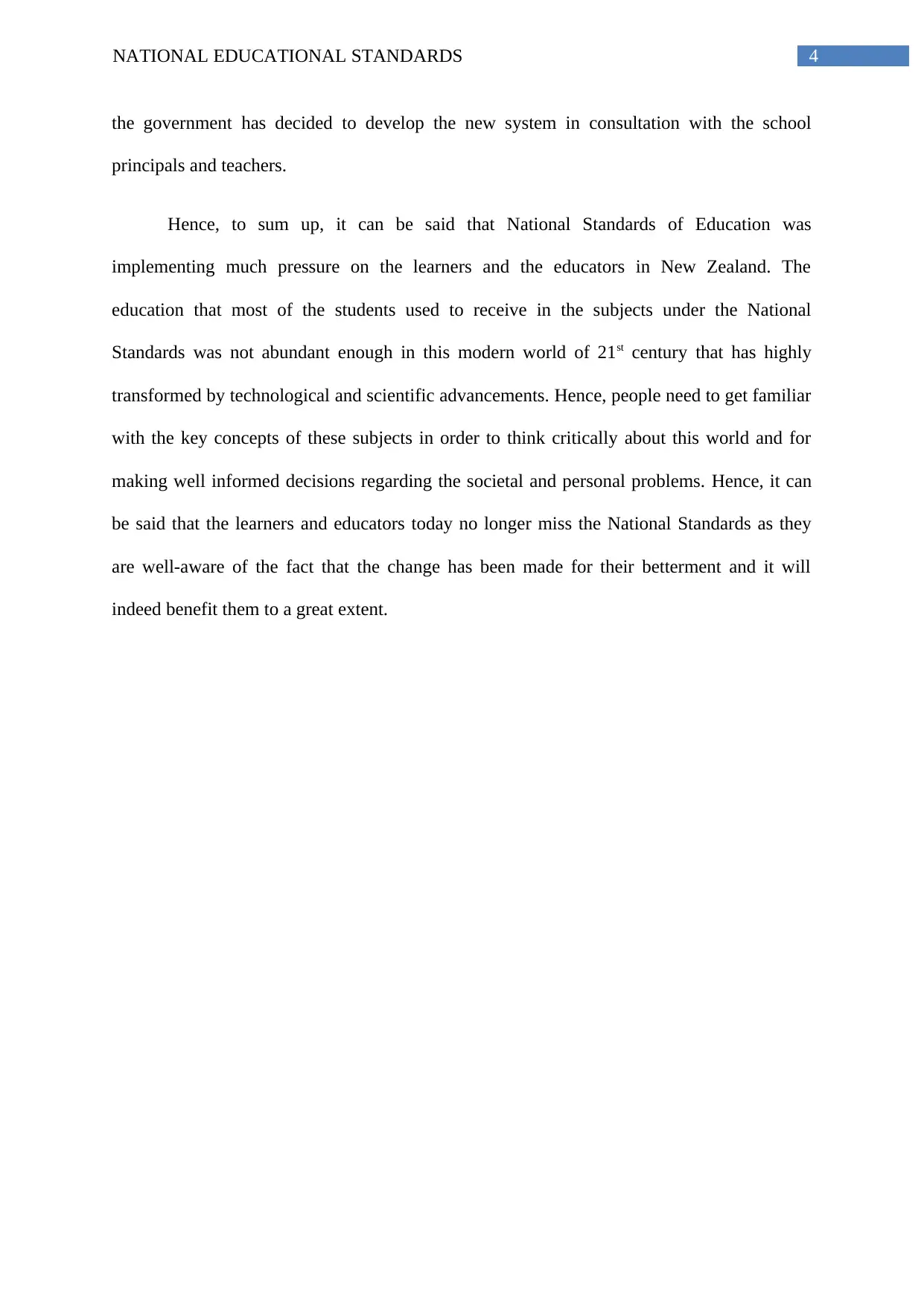
4NATIONAL EDUCATIONAL STANDARDS
the government has decided to develop the new system in consultation with the school
principals and teachers.
Hence, to sum up, it can be said that National Standards of Education was
implementing much pressure on the learners and the educators in New Zealand. The
education that most of the students used to receive in the subjects under the National
Standards was not abundant enough in this modern world of 21st century that has highly
transformed by technological and scientific advancements. Hence, people need to get familiar
with the key concepts of these subjects in order to think critically about this world and for
making well informed decisions regarding the societal and personal problems. Hence, it can
be said that the learners and educators today no longer miss the National Standards as they
are well-aware of the fact that the change has been made for their betterment and it will
indeed benefit them to a great extent.
the government has decided to develop the new system in consultation with the school
principals and teachers.
Hence, to sum up, it can be said that National Standards of Education was
implementing much pressure on the learners and the educators in New Zealand. The
education that most of the students used to receive in the subjects under the National
Standards was not abundant enough in this modern world of 21st century that has highly
transformed by technological and scientific advancements. Hence, people need to get familiar
with the key concepts of these subjects in order to think critically about this world and for
making well informed decisions regarding the societal and personal problems. Hence, it can
be said that the learners and educators today no longer miss the National Standards as they
are well-aware of the fact that the change has been made for their betterment and it will
indeed benefit them to a great extent.
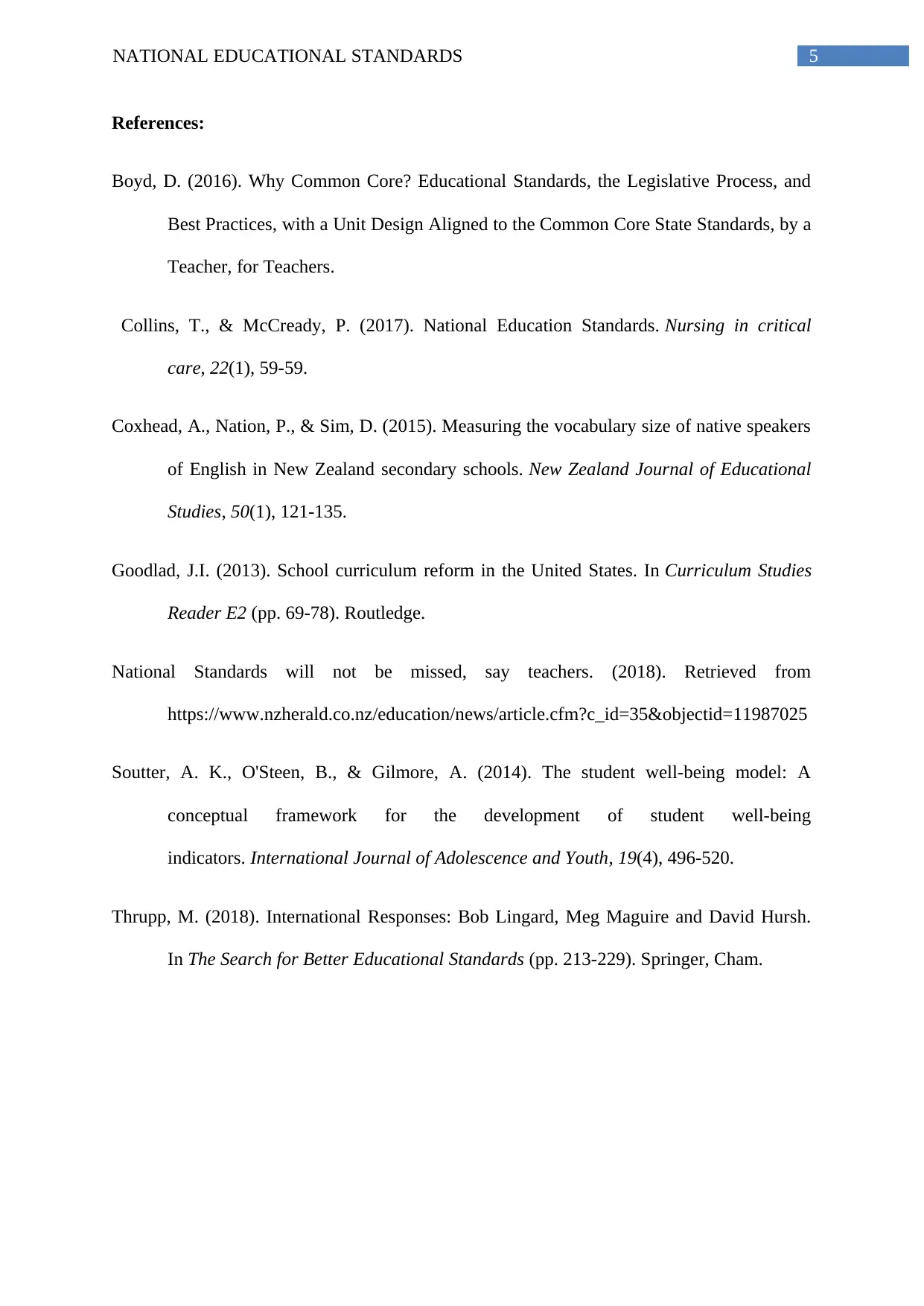
5NATIONAL EDUCATIONAL STANDARDS
References:
Boyd, D. (2016). Why Common Core? Educational Standards, the Legislative Process, and
Best Practices, with a Unit Design Aligned to the Common Core State Standards, by a
Teacher, for Teachers.
Collins, T., & McCready, P. (2017). National Education Standards. Nursing in critical
care, 22(1), 59-59.
Coxhead, A., Nation, P., & Sim, D. (2015). Measuring the vocabulary size of native speakers
of English in New Zealand secondary schools. New Zealand Journal of Educational
Studies, 50(1), 121-135.
Goodlad, J.I. (2013). School curriculum reform in the United States. In Curriculum Studies
Reader E2 (pp. 69-78). Routledge.
National Standards will not be missed, say teachers. (2018). Retrieved from
https://www.nzherald.co.nz/education/news/article.cfm?c_id=35&objectid=11987025
Soutter, A. K., O'Steen, B., & Gilmore, A. (2014). The student well-being model: A
conceptual framework for the development of student well-being
indicators. International Journal of Adolescence and Youth, 19(4), 496-520.
Thrupp, M. (2018). International Responses: Bob Lingard, Meg Maguire and David Hursh.
In The Search for Better Educational Standards (pp. 213-229). Springer, Cham.
References:
Boyd, D. (2016). Why Common Core? Educational Standards, the Legislative Process, and
Best Practices, with a Unit Design Aligned to the Common Core State Standards, by a
Teacher, for Teachers.
Collins, T., & McCready, P. (2017). National Education Standards. Nursing in critical
care, 22(1), 59-59.
Coxhead, A., Nation, P., & Sim, D. (2015). Measuring the vocabulary size of native speakers
of English in New Zealand secondary schools. New Zealand Journal of Educational
Studies, 50(1), 121-135.
Goodlad, J.I. (2013). School curriculum reform in the United States. In Curriculum Studies
Reader E2 (pp. 69-78). Routledge.
National Standards will not be missed, say teachers. (2018). Retrieved from
https://www.nzherald.co.nz/education/news/article.cfm?c_id=35&objectid=11987025
Soutter, A. K., O'Steen, B., & Gilmore, A. (2014). The student well-being model: A
conceptual framework for the development of student well-being
indicators. International Journal of Adolescence and Youth, 19(4), 496-520.
Thrupp, M. (2018). International Responses: Bob Lingard, Meg Maguire and David Hursh.
In The Search for Better Educational Standards (pp. 213-229). Springer, Cham.
⊘ This is a preview!⊘
Do you want full access?
Subscribe today to unlock all pages.

Trusted by 1+ million students worldwide
1 out of 6
Related Documents
Your All-in-One AI-Powered Toolkit for Academic Success.
+13062052269
info@desklib.com
Available 24*7 on WhatsApp / Email
![[object Object]](/_next/static/media/star-bottom.7253800d.svg)
Unlock your academic potential
Copyright © 2020–2026 A2Z Services. All Rights Reserved. Developed and managed by ZUCOL.





